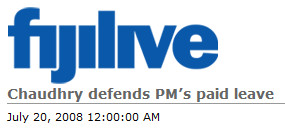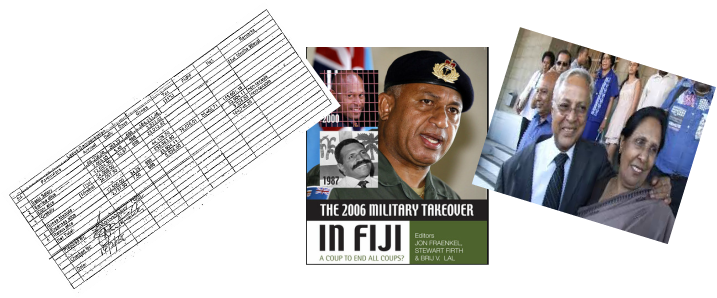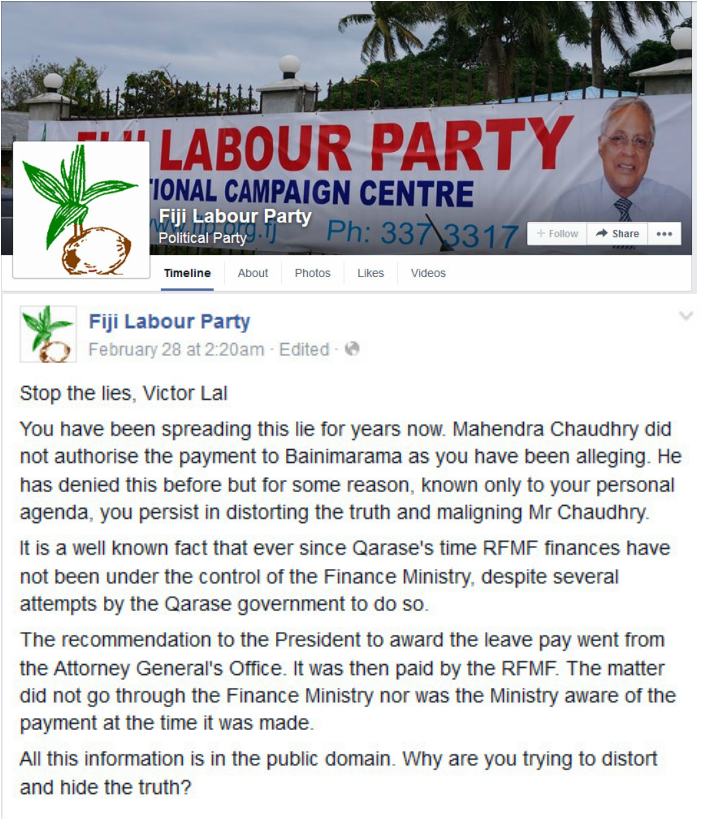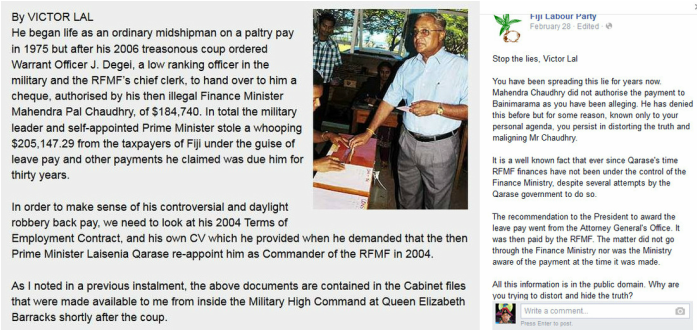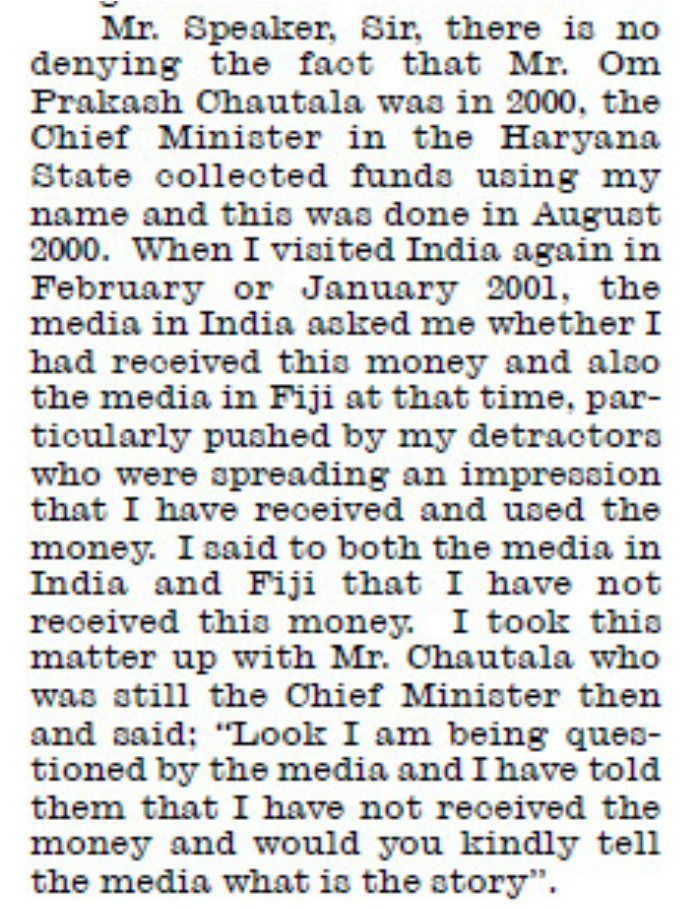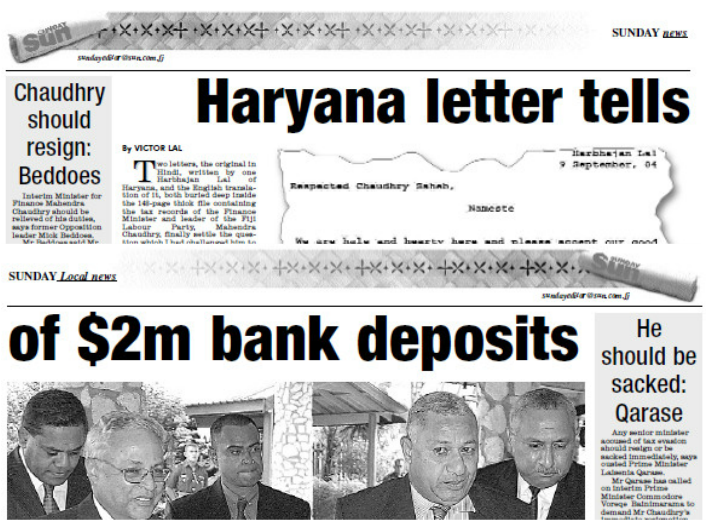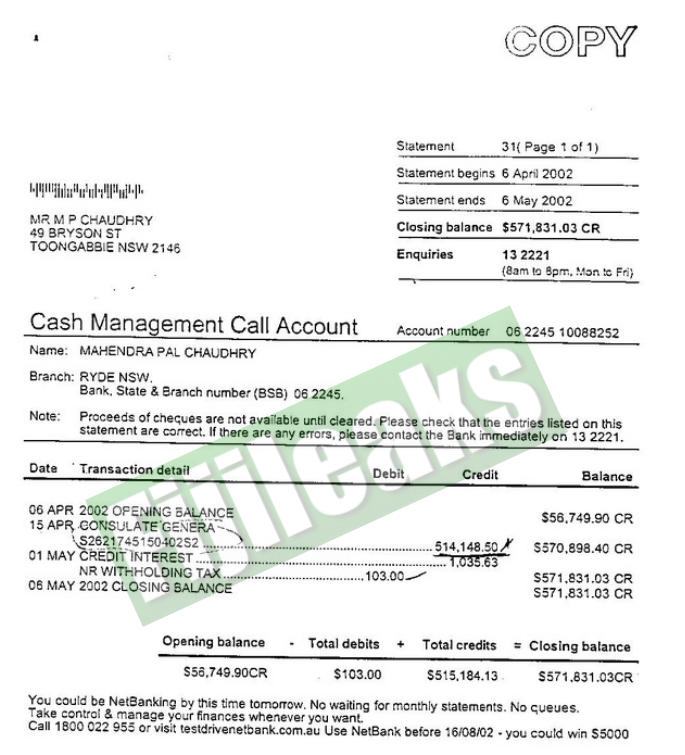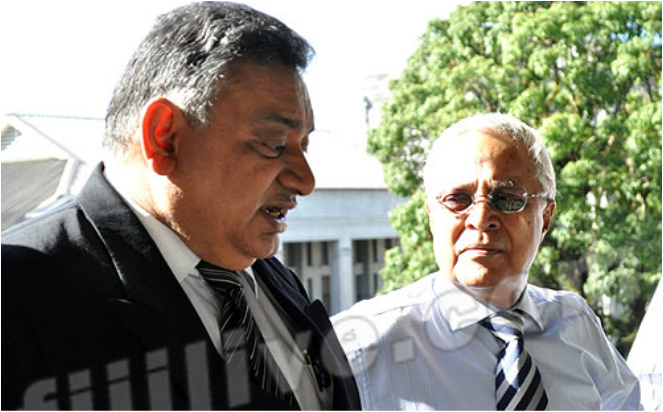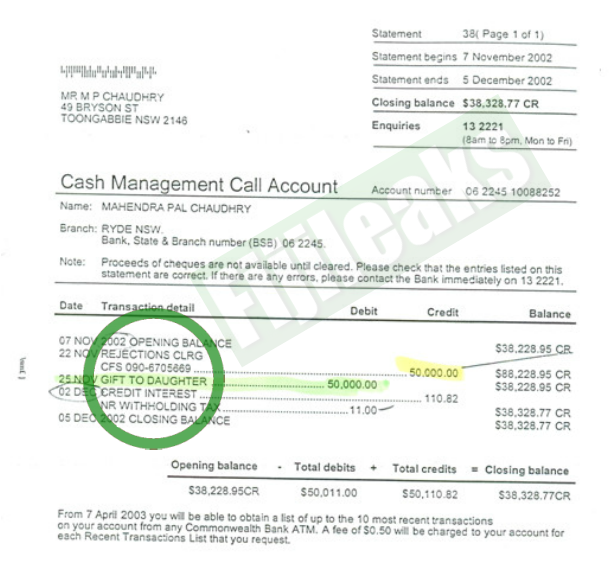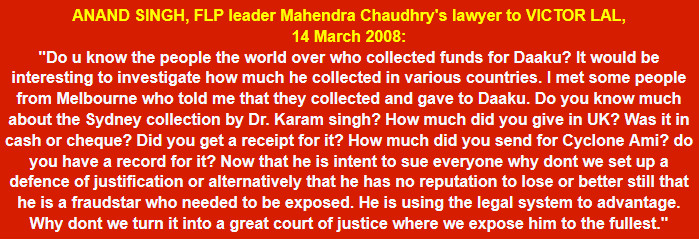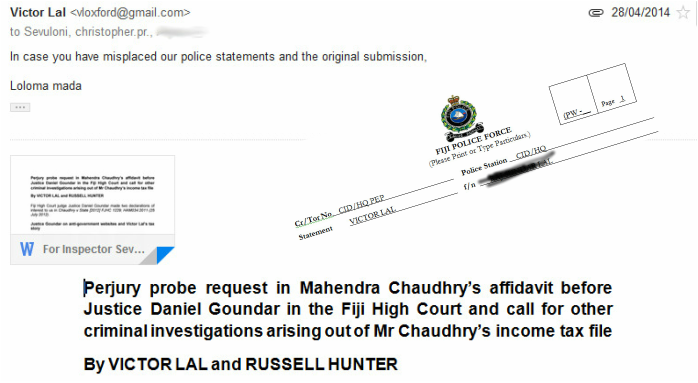"The recommendation to the President to award the leave pay went from the Attorney General's Office. It was then paid by the RFMF. The matter did not go through the Finance Ministry nor was the Ministry aware of the payment at the time it was made."
FLP Statement 'Stop the Lies, Victor Lal', February 28, 2015
"Interim Finance Minister Chaudhry told Fijilive that money was due to Bainimarama and the Finance Ministry did the right thing in giving what was owed to him. He added that no one has a right to dwell into the private matters of the interim Prime Minister." Fijilive 2008
"In mid-2008 Bainimarama received $184,740 payment from Finance Minister Mahendra Chaudhry for leave not taken exteding back to 1978" - Professors Stewart Firth and Jon Fraenkel in The 2006 Military Takeover in Fiji: A Coup to End All Coups; Chaudhry also contributed a chapter 'Democracy' versus good governance in that book; and so did deported Fiji Sun publisher Russell Hunter, State Control and Self Censorship in the Media after the Coup; Victor Lal and Russell Hunter had exposed Chaudhry's secret $2million which had resulted in the abduction, detention and deportation of Hunter out of Fiji in February 2008 and the subsequent arrest, trial and conviction of Chaudhry in May 2014
ANAND SINGH, FLP leader Mahendra Chaudhry's lawyer
to VICTOR LAL, 21 February 2008
"The question that comes to mind is as to why he did not transfer the funds to FLP? He belonged to FLP at the time and must report any funds to FLP and transfer it to it. I believe that Daaku's outburst in parliament and the argument should be used against him. You would have to read the Hansard alongside my comments to fully follow what I am saying. Eventually I come to the conclusion the the funds were raised fro [for] the community that he has converted to his own use. Incidentally, that story abt the daughter [getting $50,000 as gift from Chaudhry] was very successful. It has got samdhi sahida very quiet. i was looking for Rani's picture and Juniors' that could be published with proper notation as unintended beneficiaries. Perhaps my mind is racing off too much?... For the moment dont you think u should repeat the story with specific details of the Bank transactions. In another unrelated story have a detaied piece on the explanation he gave to Parliamnet and which will be priveleged. The reaaders will read both and know the real culprit and see for themselves the lie that Daaku said in Parliamnent. The facts as disclosed prima facie indicate he lied to Parliamnet and the people of Fiji. If he lied and as we know he did by not telling the complete story as Q had asked him to, he would have been liable to be referred to the Priveleges Committee of Parliament for a serious breach of privilege. In the absence of Parliamnet, the matter has to be dealt with publically thru th media. Daaku was on TV last nite on other issues. He had the artificial smile all over his face. He is pretending nothing has happened or is getting ready to attack everyone else but himself. thsi man is so shameless and ruthless. I dnt think he has any scruples abt taking the money belonging to the people of Fiji. ____ met with Indian high Commissioner yesterday. He has his head buried in sand. Says the money could not have been paid into the Bank by the Consulate General. he was very dismissive.and indirectly casting doubt on the authenticity of the story. I feel it is important to get a statement or verification from Harbajan before Daaku clams up. The admission from Harbajan is enough to hang Daaku politically and will go a long way as a legal defence. Just my thoughts...[The late] Dalpat [Rathod, FLP treasurer] told me that in India Daaku would go in to see the PM by himself and leave Dalpat behind. I have had a similar experience with daaku too. Daaku will forever curse himself for having left the money in au [Australia]. He must regret not putting it in Honk Kong."
“The applicant says he later found out that a former editor of the Fiji Sun obtained his confidential tax details from FIRCA and released it to Victor Lal, a former Fiji journalist residing overseas. Victor Lal published those details in anti-government websites.”
We have demonstrated that we never published Mr Chaudhry’s tax details in any anti-government websites but in the Sunday Sun dated 24 February 2008, including the first tax story in the Fiji Sun, on 15 August 2007.
1: We therefore call upon the Director of Public Prosecutions to investigative whether Mr Chaudhry committed the offence of “perjury in a false affidavit”.
2: We call upon the Director of Public Prosecutions to investigate whether Mr Chaudhry’s legal representatives in offering his affidavit to the Fiji High Court are also guilty of aiding and abetting the offence of perjury in a false affidavit, for it is abundantly clear that we did not publish Mr Chaudhry’s tax details in any anti-government websites.
3: We request the Director of Public Prosecutions to establish on what grounds the original letter tendered from one Harbhajan Lal dated 9 September 2004 to FIRCA from Haryana in India was withheld [if it was] and a new letter from Delhi Study Group dated 12 October 2004 substituted in Mr Chaudhry’s affidavit before Justice Daniel Goundar in the Fiji High Court. The “Harbhajan Lal Letter” of 9 September 2004 states the money was collected in Haryana and part of it was transacted through the Indian Consulate in Sydney, Australia. Harbhajan Lal wrote from Haryana:
“Respected Chaudhry Saheb, Nameste. We are hale and hearty here and please accept our good wishes. I received your letter. You have asked for details of the funds. You may recall that when you were here in the year 2000, we had formed a committee, which requested you to leave Fiji and stay in Australia since the situation in Fiji was not safe and you were not secure there. The committee also assured you that it would collect funds for your settlement in Australia. Lakhs of people from Haryana including traders, businessmen, landlords and non-resident Indians contributed heavily for the cause. The amount was pouring in for three years, which was sent to you from the year 2000 to 2002. The total amounting to nearly AUD fifteen laks was sent to you with the help of Government of India through its Consulate General in Sydney. We sent AUD 503,000/- as first instalment in the year 2000. In 2001, AUD $486,890/- was sent and then in 2002 AUD $514, 149/- was sent.”
The “Delhi Study Group Letter” states, “This is to confirm that funds were collected in New Delhi and other parts of India, including NRI's (Non-Resident Indians) to assist Hon'ble Mahendra Pal Chaudhry, Former Prime Minister of Fiji in 2000-2002.”
5: We call upon the Director of Public Prosecutions to ask Mr Chaudhry who transferred the money from India – Delhi Study Group based in New Delhi or Harbahajan Lal in Haryana, India?
6: We request the Director of Public Prosecutions to establish whether Mr Chaudhry and Nalin Patel, in presenting to FIRCA the letter from Harbhjan Lal, whose content was materially false [re his enquiring the details of the funds etc] –Chaudhry (and Nalin Patel) committed a criminal offence under Fiji’s tax laws by offering a false document to FIRCA, namely the Harbhajan Lal letter.
7: We request the Director of Public Prosecutions to investigate the Suva accountancy firm of G. Lal & Co, Mr Chaudhry’s delegated tax agent to deal with FIRCA in 2004, to establish whether it was aware of the inconsistencies in the Harbhajan Lal-Chaudhry correspondence regarding the $2million, and whether the accountancy firm also had in its possession the Delhi Support Group letter dated 12 October 2004.
8: We request the Director of Public Prosecutions to establish whether Mr Chaudhry and Nalin Patel submitted Harbhajan Lal’s letter knowing its content was false in material respects to prevent FIRCA from pursuing the original source of the funds in Mr Chaudhry’s Australian bank account.
9: We request the Director of Public Prosecutions to investigative whether Mr Chaudhry, in presenting the Tax Amnesty submission to the Cabinet in September 2007 for endorsement, might have abused office as Interim Finance Minister and direct line manager of Fiji Island Revenue and Customs Authority (FIRCA), to benefit himself, and to escape any future criminal prosecutions for submitting late tax returns between 2000 and 2003. We have documentary evidence that in August 2007 Mr Chaudhry still owed FIRCA $57,000 in tax debt, due to be paid on 9 August 2007. His own $57,000 could have fitted into insufficient advance payment or even late payment amnesty.
10. We therefore request the DPP to establish whether Mr Chaudhry had taxes or returns outstanding and paid during the amnesty period he had ordered and hence gained avoidance of penalties, and if so, then a case for Abuse of Office as Finance Minister and line manager of FIRCA could be made against him.
11: We call upon the Director of Public Prosecutions to plead with the Fiji High Court to expunge the patently false claims made against us in Chaudhry v State [2012] FJHC 1229; HAM034.2011 (25 July 2012) – re that we published Mr Chaudhry’s tax details in anti-government websites. In conclusion, we leave you with the words of the great English judge, the late Lord Denning in King v Victor Parsons & Co [1973] 1 WLR 29, 33-34:
“The word 'fraud' here is not used in the common law sense. It is used in the equitable sense to denote conduct by the defendant or his agent such that it would be 'against conscience' for him to avail himself of the lapse of time. The cases show that, if a man knowingly commits a wrong (such as digging underground another man's coal); or a breach of contract (such as putting in bad foundations to a house), in such circumstances that it is unlikely to be found out for many a long day, he cannot rely on the Statute of Limitations as a bar to the claim: see Bulli Coal Mining Co v Osborne [1899] AC 351 and Applegate v Moss [1971] 1 QB 406. In order to show that he 'concealed' the right of action 'by fraud', it is not necessary to show that he took active steps to conceal his wrongdoing or breach of contract. It is sufficient that he knowingly committed it and did not tell the owner anything about it. He did the wrong or committed the breach secretly. By saying nothing he keeps it secret. He conceals the right of action. He conceals it by 'fraud' as those words have been interpreted in the cases. To this word 'knowingly' there must be added recklessly': see Beaman v ARTS Ltd [1949] 1 KB 550, 565-566. Like the man who turns a blind eye. He is aware that what he is doing may well be a wrong, or a breach of contract, but he takes the risk of it being so. He refrains from further inquiry least it should prove to be correct: and says nothing about it. The court will not allow him to get away with conduct of that kind. It may be that he has no dishonest motive: but that does not matter. He has kept the plaintiff out of the knowledge of his right of action: and that is enough: see Kitchen v Royal Air Force Association [1958] 1 WLR 563.”
The limitation statute’s aim is to prevent citizens from being oppressed by stale claims, to protect settled interests from being disturbed, to bring certainty and finality to disputes and so on. These are, as legal commentators have pointed out, laudable aims but they can conflict with the need to do justice in individual cases where an otherwise unmeritorious defendant can play the limitation trump card and escape liability.
We call upon the Director of Public Prosecutions to ask Mr Chaudhry which of the two letters – Harbhajan Lal or Delhi Study Group – is the lie – as they both can’t be genuine. Apart from the false accusations against us in his affidavit, the contents of the Harbhajan Lal letter dated 9 September 2004 does not accord with his bank statements from the Commonwealth Bank of Australia which he offered to FIRCA.
In our humble submission we beg the Director of Prosecutions to call upon the Fiji High Court to waiver the statute of limitation for prima facie there is evidence in the “Harbhajan Lal” letter that Mr Chaudhry obtained a favourable decision from FIRCA (an oversight on the part of FIRCA tax officers) through alleged fraud – the contents of the Harbhajan Lal letter does not square with his Australian bank statements.
Moreover, although we do not have a copy of Mr Chaudhry’s affidavit cited by Justice Goundar (despite requests for one from the Director of the Public Prosecutions) we call upon the Director of Public Prosecutions to examine the contents of both the Harbhajan Lal and the Delhi Support Group letters. If there are glaring disparities in the two letters than Mr Chaudhry must be deprived of the statute of limitation for the “fraud”, if any on his part, would be a continuing “fraud” since 2004 when he first offered Harbhajan Lal’s letter and now the Delhi Study Group letter in 2012 to explain away the $2million is his Australian bank account.
VICTOR LAL and RUSSELL HUNTER, 4 September 2012
